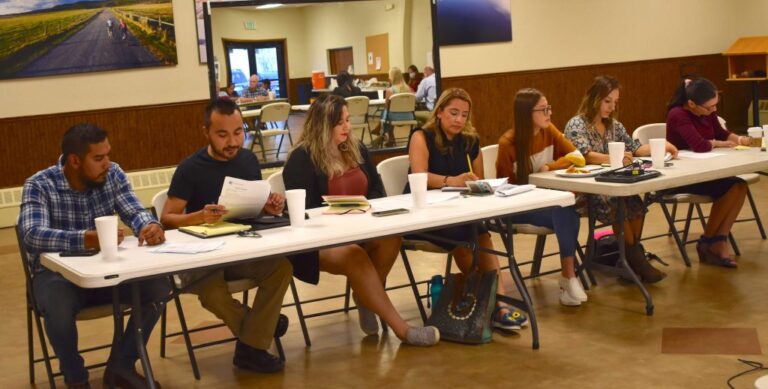Garfield County’s Latino advocacy committee wants to see more Spanish-speaking dispatchers hired in the county to assist Latino residents who call 911.
Recently, the county’s Latino Community Committee met with the county Emergency Communications Authority Board to learn more about the operation and to offer some suggestions.
“We want to build trust with the organizations we work with and help them come up with some better approaches and find solutions,” said Crystal Mariscal, a New Castle Town Council member and community organizer who co-founded the Latino Community Committee in 2021 with the blessing of the Garfield County commissioners.
Emergency communications was a topic of discussion at one of the committee’s meetings early on, and the group decided to continue that conversation more directly, Mariscal said.
“After learning how challenging, intensive and important your job and that of the EMS staff is, we have a deeper appreciation for keeping our county safe,” she wrote in an Aug. 2 letter to Garfield County Emergency Communications Authority Executive Director Carl Stephens and the authority’s board members.
Currently, two of the county’s 21 emergency dispatchers are bilingual in English and Spanish, Stephens said.
To interpret communications that come into the emergency call center in Spanish and other languages besides English, the authority uses the real-time interpretation service Voiance.
The text-to-911 service the county uses also allows for messaging with Spanish translation, he said.
“Even if everyone spoke Spanish, we would still need that because we do get calls in other languages,” Stephens said.
The Latino Committee, in its letter, urged the emergency communications staff who know Spanish to use those language skills whenever someone calls in speaking Spanish.
The authority should also consider providing more financial assistance for dispatchers to learn Spanish, the letter suggests.
Voiance has an associated cost, Mariscal noted.
“Our suggestion would be to use those funds to compensate employees who have competent and appropriate English/Spanish bilingual skills,” the Latino Committee also recommends.
Stephens said the dispatch center has not had a lot of turnover, but the last position that came open was advertised in both English and Spanish, with an emphasis on bilingual skills.
“Before we advertised that position, we did hire someone who is bilingual and who is coming up on her one-year anniversary with us,” he said.
Two additional dispatchers have since been hired who are not bilingual, but the authority is open to helping any staff who wants to learn Spanish to do so, Stephens said.
He said the interpretation service is often still preferred, even for dispatchers who are bilingual, in order to have the most accurate translation possible in an emergency situation.
The service is billed based on the amount of minutes used, and can cost a “couple hundred” dollars a month, Stephens said.
He said the input from the Latino Committee has been helpful.
“They give us ideas that we haven’t thought about,” he said. “But sometimes implementing those suggestions can take time.”
Senior Reporter/Managing Editor John Stroud can be reached at 970-384-9160 or jstroud@postindependent.com.



